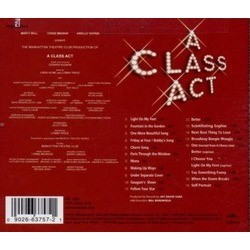A Class Act - A Musical About Musicals
2001 Original Cast
¡Subscríbete!
¡Manténgase informado y obtener mejor acceso a la información de los coleccionistas!
¡Manténgase informado y obtener mejor acceso a la información de los coleccionistas!
| # | Pista | Artista/Compositor | Duración |
|---|---|---|---|
| 1. | Light On My Feet | Lonny Price | 5:07 |
| 2. | Fountain in the Garden | Nancy Kathryn Anderson | 0:58 |
| 3. | One More Beautiful Song | Lonny Price | 2:16 |
| 4. | Friday At Four/Bobby's Song | Lonny Price | 2:15 |
| 5. | Charm Song | Jonathan Freeman | 1:43 |
| 6. | Paris Through the Window | Lonny Price | 3:32 |
| 7. | Mona | Nancy Kathryn Anderson | 3:07 |
| 8. | Making Up Ways | Lonny Price | 1:24 |
| 9. | Under Separate Cover | Carolee Carmello | 2:23 |
| 10. | Gauguin's Shoes | The Company | 3:17 |
| 11. | Follow Your Star | Randy Graff | 2:14 |
| 12. | Better | Lonny Price | 3:51 |
| 13. | Scintillating Sophie | Lonny Price | 1:35 |
| 14. | Next Best Thing To Love | Randy Graff | 3:01 |
| 15. | Broadway Boogie Woogie | Carolee Carmello | 2:01 |
| 16. | One/Better (reprise)/I Choose You/Light on my Feet (reprise) | The Company | 5:05 |
| 17. | Say Something Funny | Carolee Carmello | 2:07 |
| 18. | When The Dawn Breaks | Lonny Price | 0:54 |
| 19. | Self Portrait | The Company | 6:10 |
| 53:00 |
'Life can only be understood backwards, but it must be lived forwards' runs the famous observation by Kierkegaard, but in a sense it also applies to the making of this 'musical about musicals,' which draws on the life and work of Ed Kleban. Though already assured of a place in musical theater's pantheon for having written the lyrics to the pathbreaking A Chorus Line, Kleban was far more than a one-hit wonder. In fact he composed both music and lyrics for a variety of musicals that never got produced, leaving a trunk of songs behind unheard at his untimely death in 1987 at age 48 (just a few days off from his 'favorite holiday,' Valentine's Day). These are the basis for A Class Act, a show put together by Kleban's friend Linda Kline and Lonny Price (best known for the role of Charley Kringas in Merrily We Roll Along). Instead of a posthumous 'tribute' simply piecing together unrelated songs willy-nilly, the concept here--first unveiled at the Manhattan Theatre Club before moving to Broadway in February 2001--is far more intriguing. It uses a flashback frame to retrace the high and low points of Kleban's personal and professional life, which is punctuated by several near-breakdowns (and a bona fide one, during college, which led to his epiphany that he was meant to spend his life as a songwriter). The show integrates songs from widely different projects into the narrative, their topics ranging from the tricks of the songwriting trade to divorce and self-scrutiny, as each number crystallizes a particular moment of insight. Kleban's craft, especially when experienced in this context, is imbued with a personal, quirky touch, and it's impressive: there's a Sondheim-like cleverness and poignancy to much of the word play (Sondheim himself reportedly has expressed open envy for 'Better,' which gives a lift to act 2's opening), an inventive use of conversational rhythms, and a natural flow to the melody that becomes genuinely memorable in songs like 'Next Best Thing to Love' (a ballad for Kleban's platonic soul mate, Sophie, movingly performed by Randy Graff) and 'Say Something Funny.' Ronny Price brings a vulnerable yet likeable demeanor as the Kleban character, thereby offsetting the role's tendency to self-pity and kvetch. By the final summing up of 'Self-Portrait,' with Kleban's returned ghost surrounded by friends, the payoff feels not sentimental but earned. It's a thoughtful addition to what is after all an impressive line in musical theater--the 'meta'-musical--but also a loving, specific portrait of a lost era of show biz in the making.



